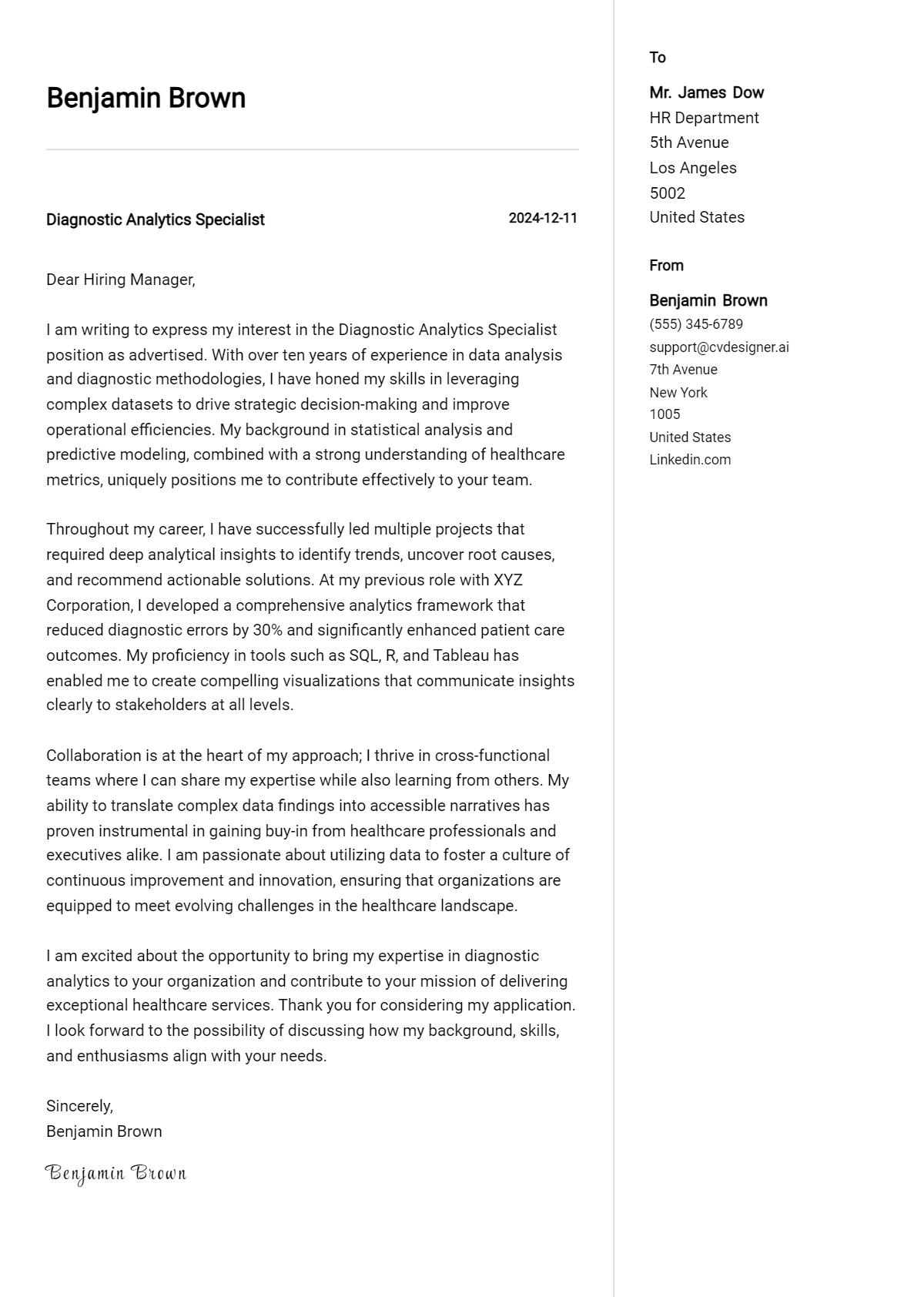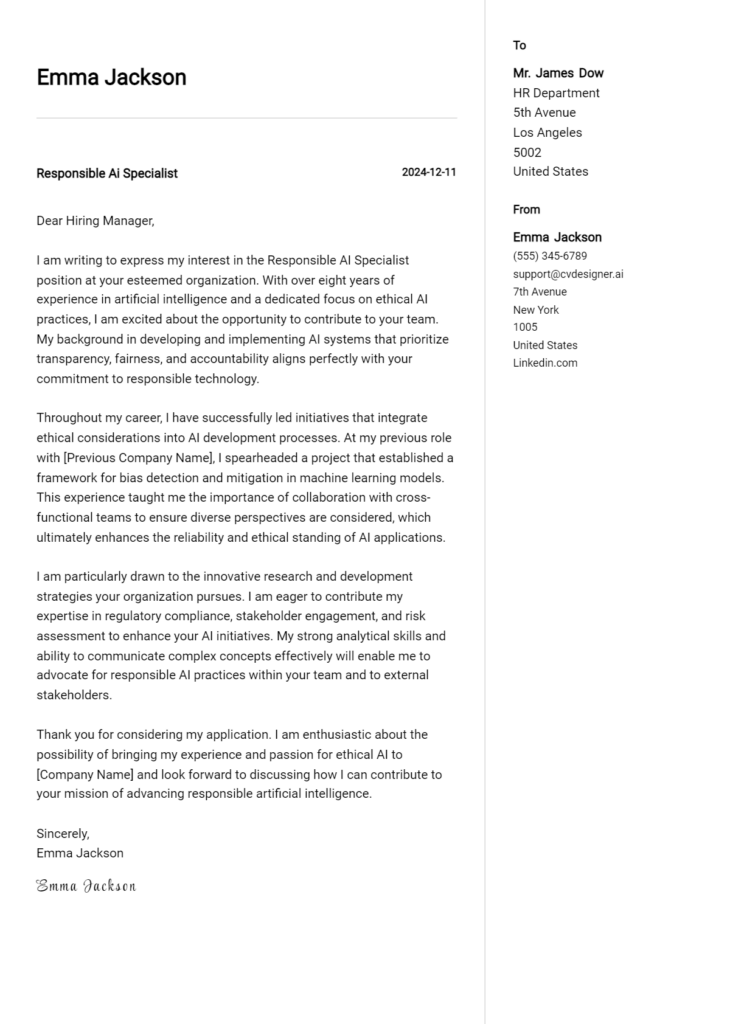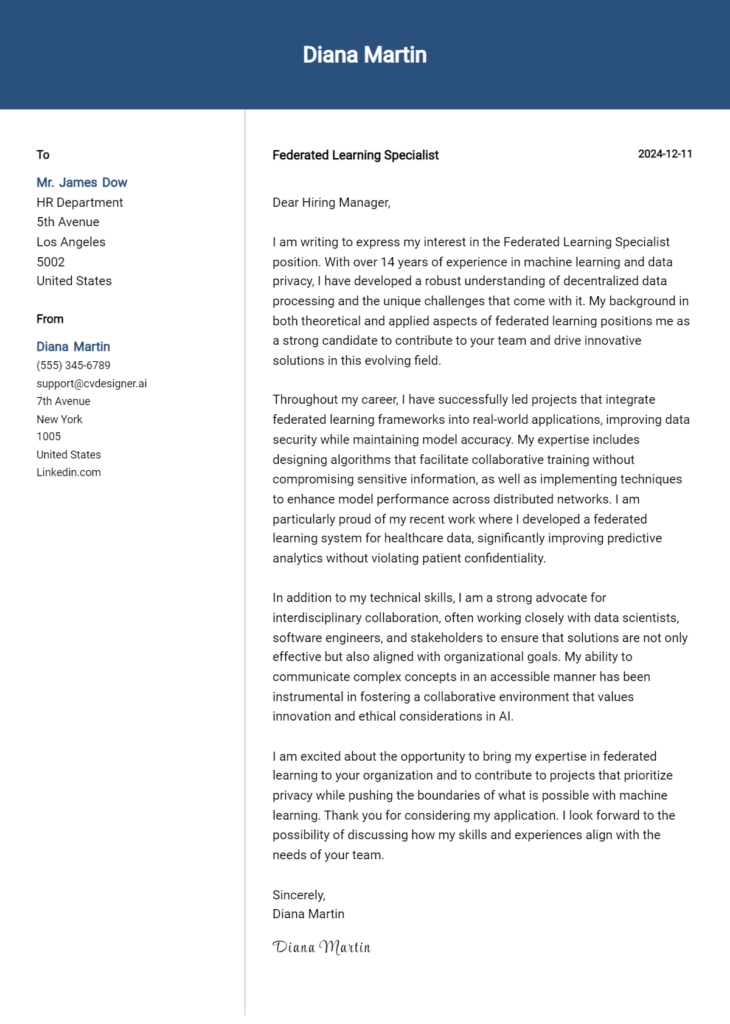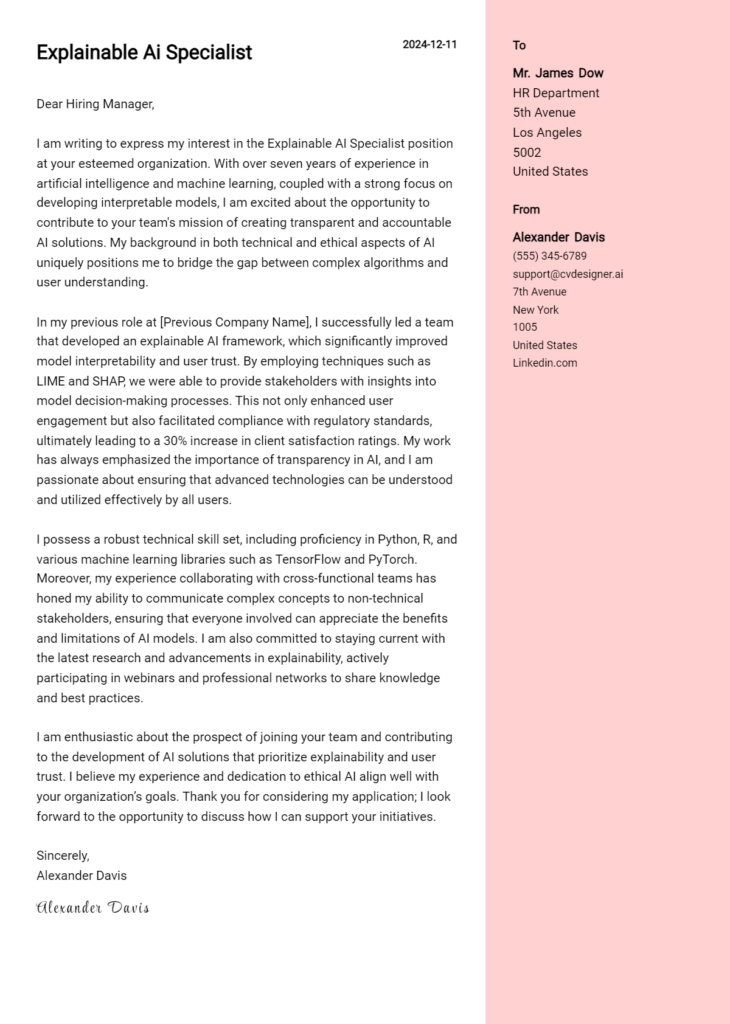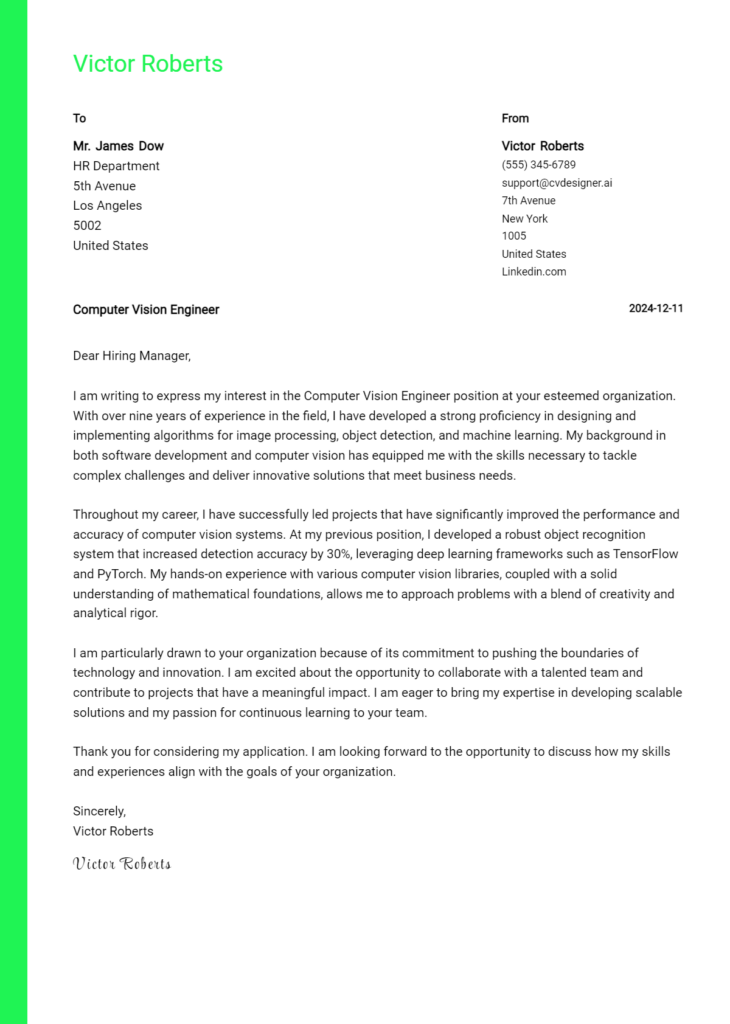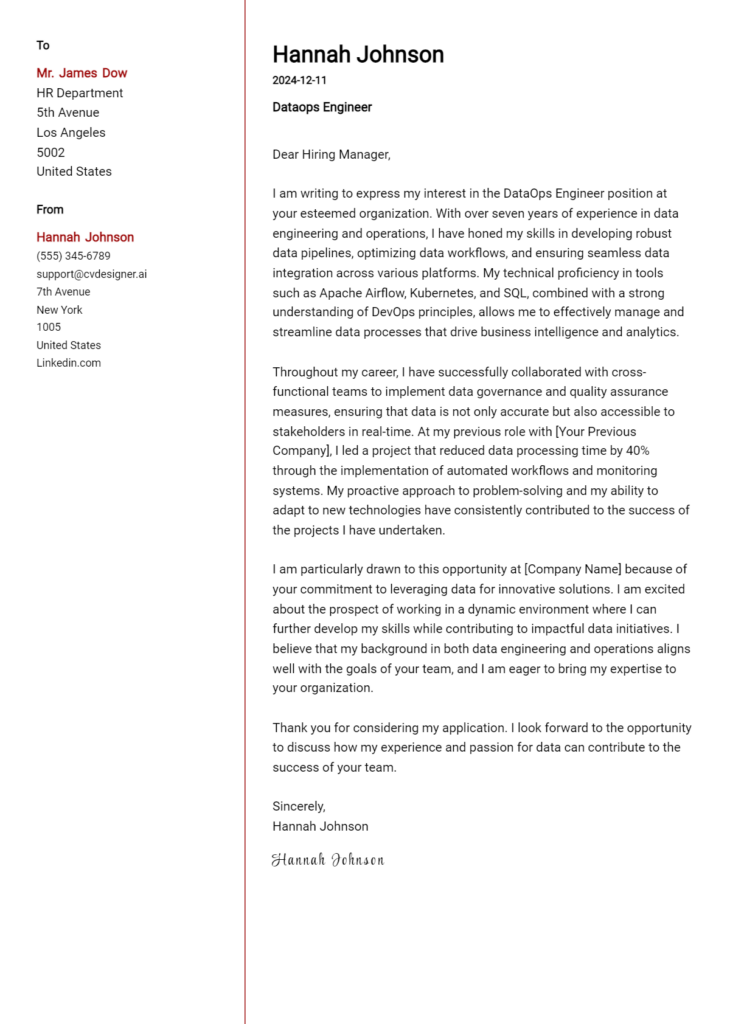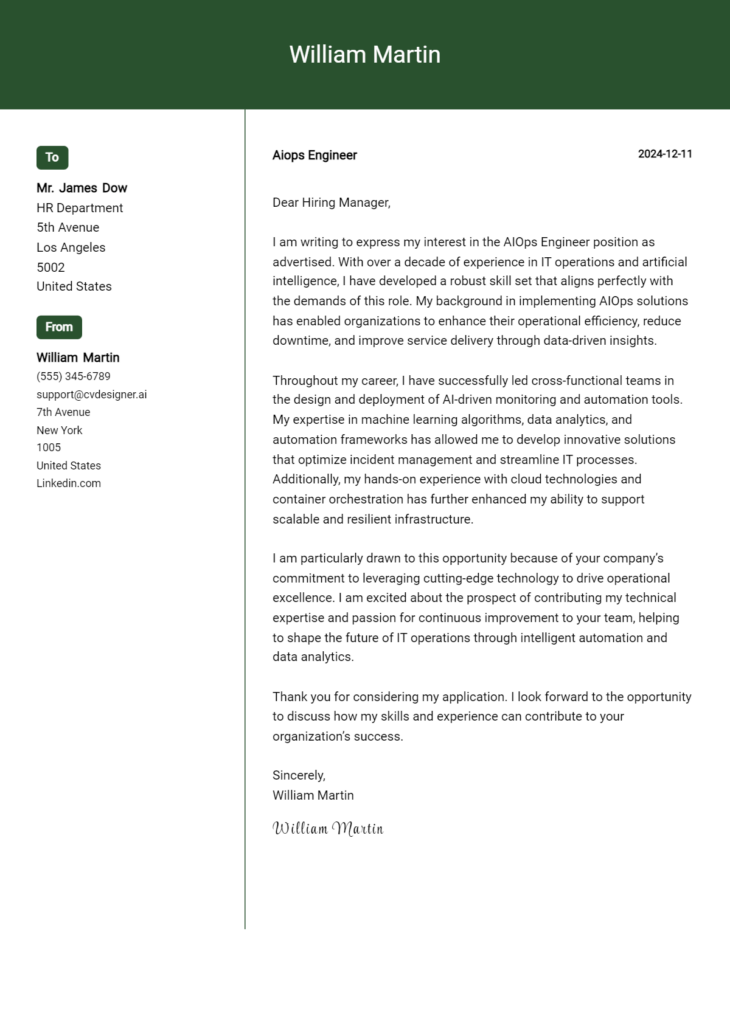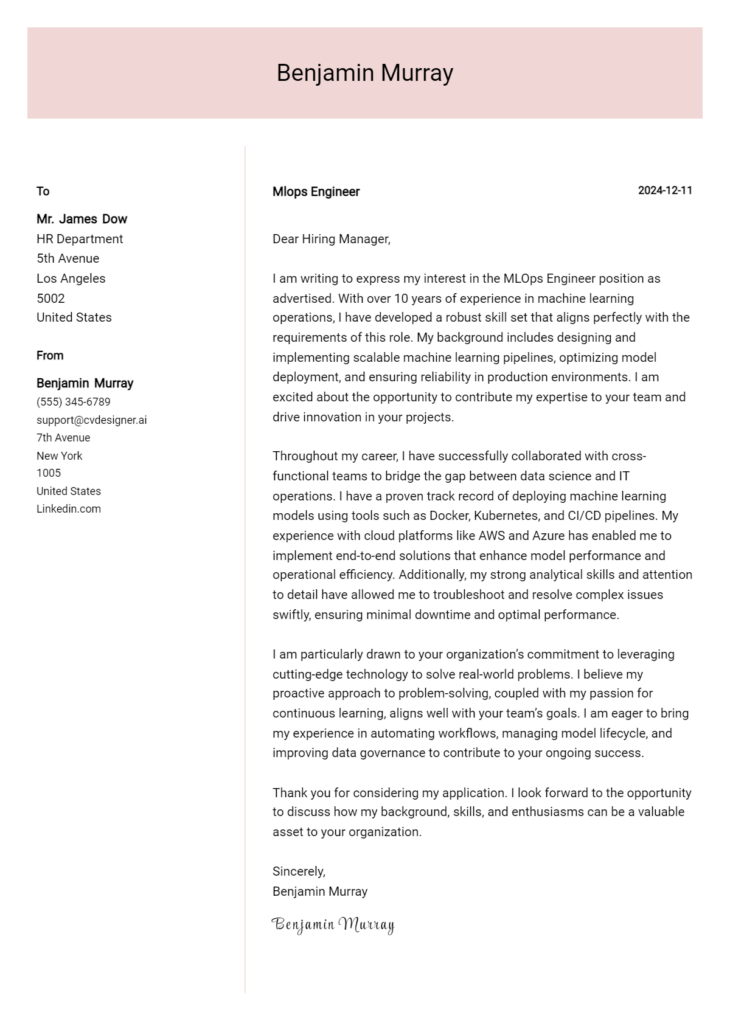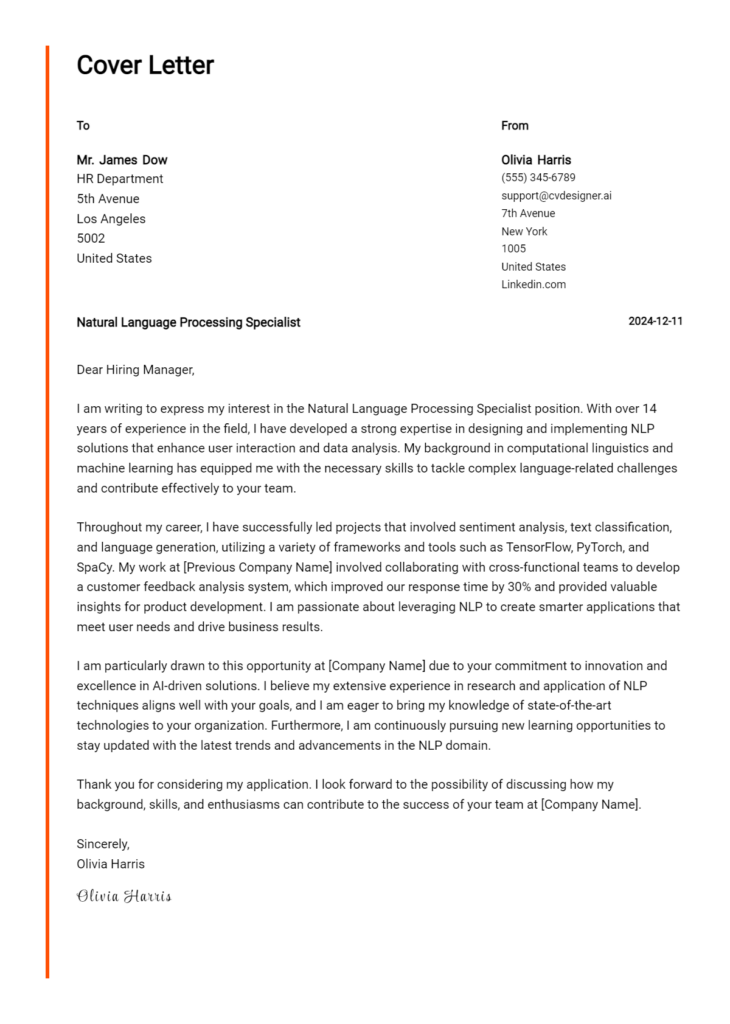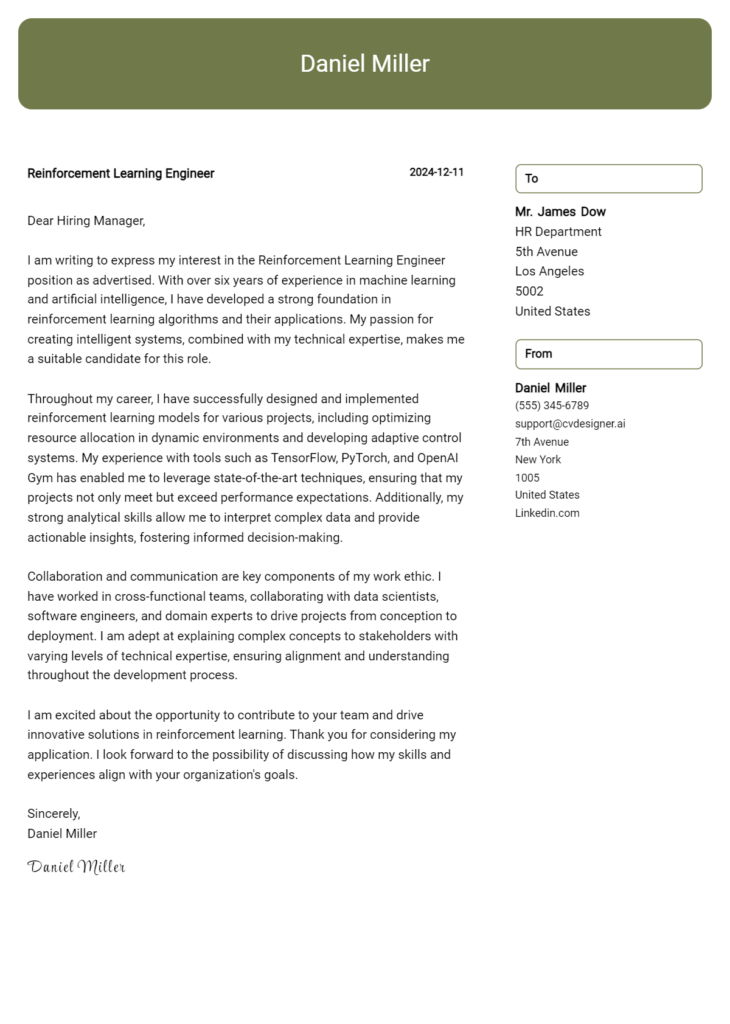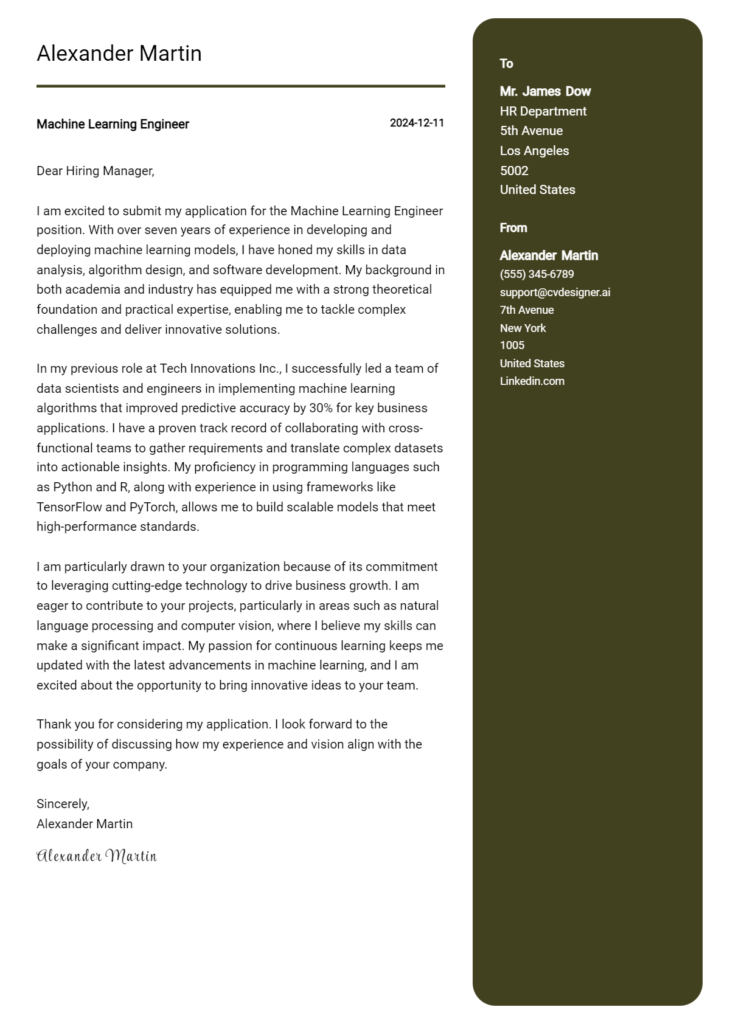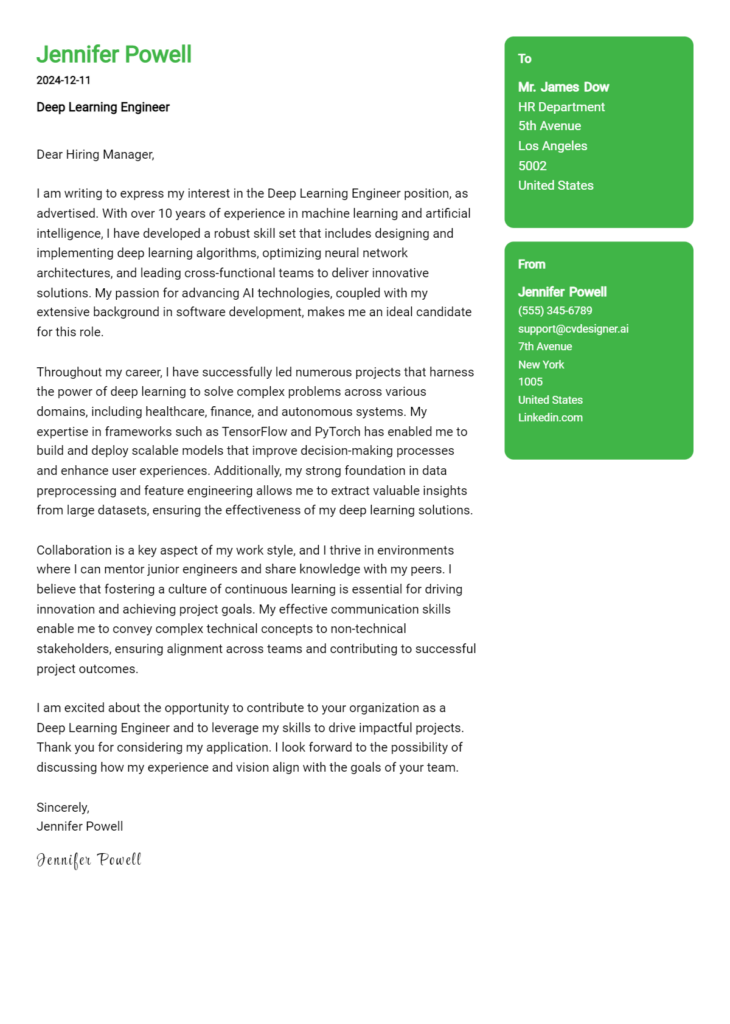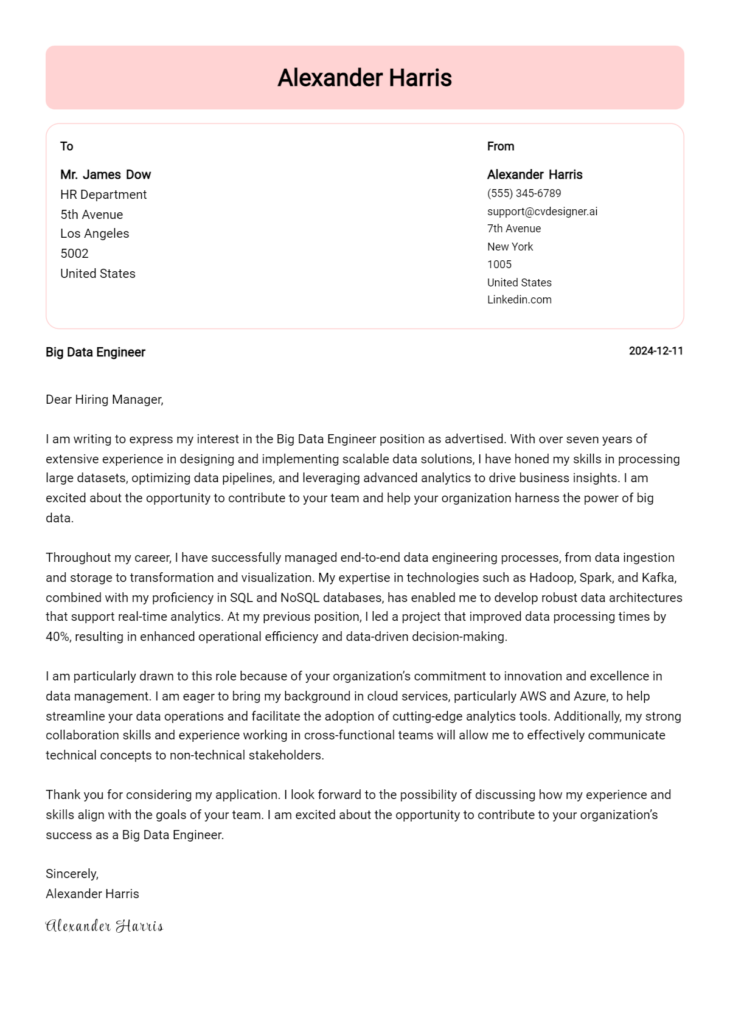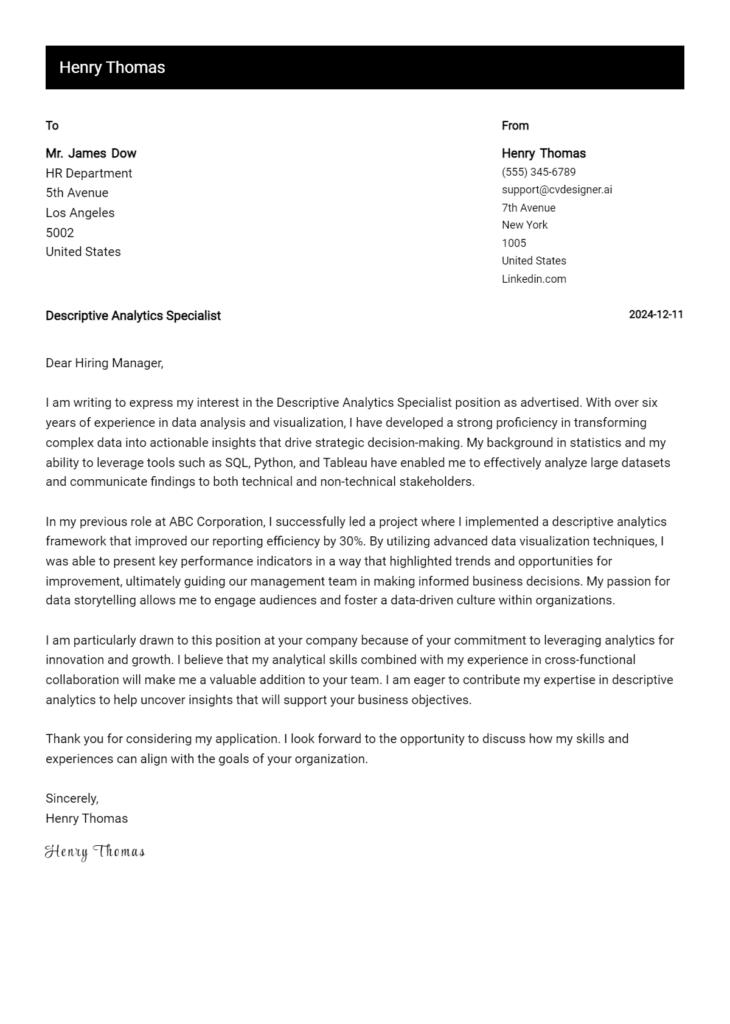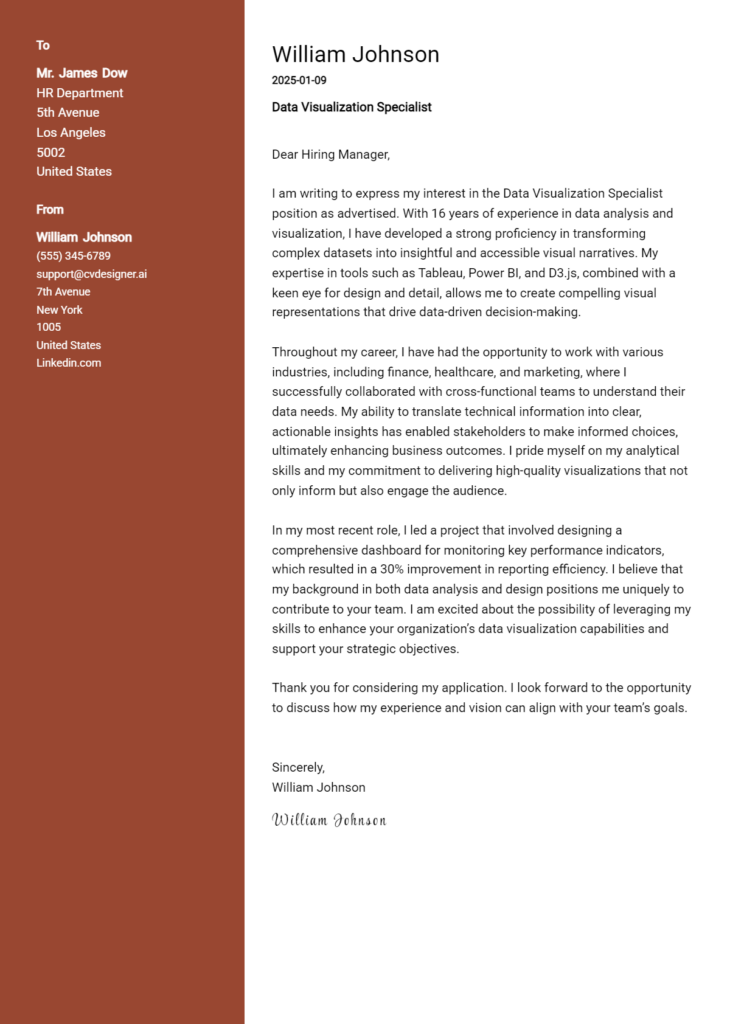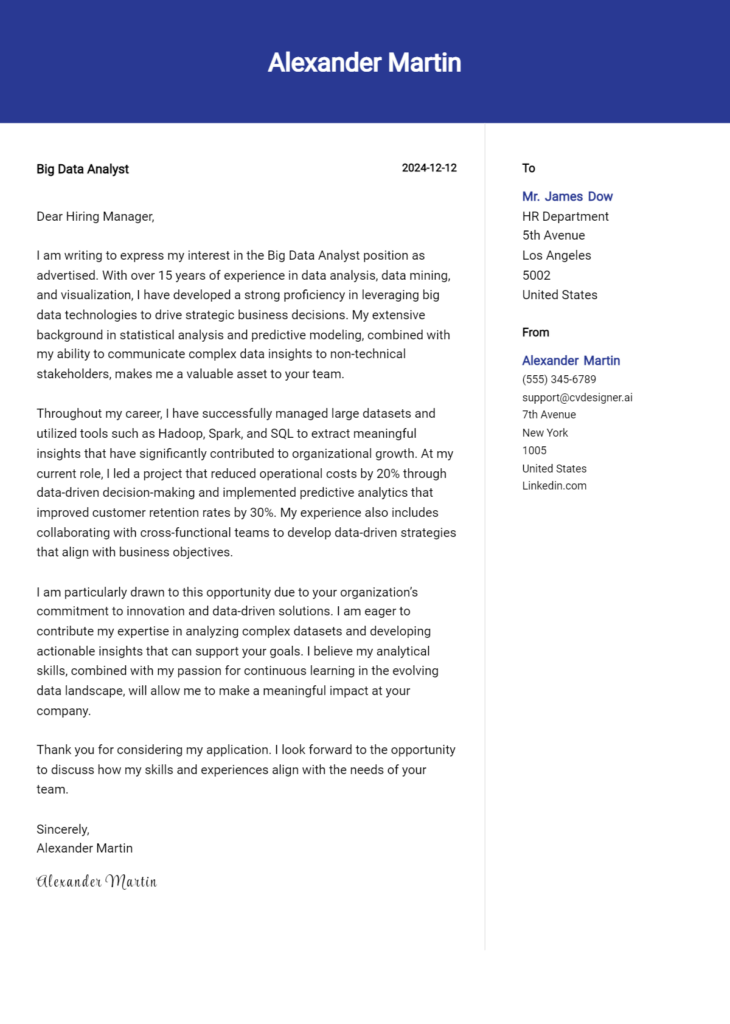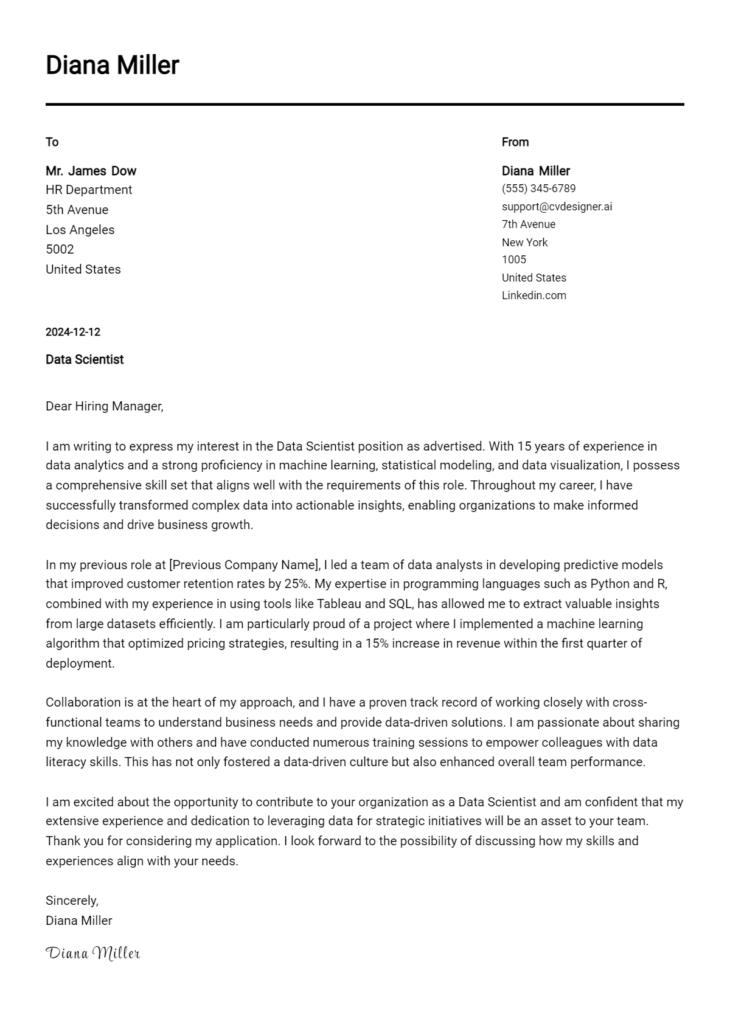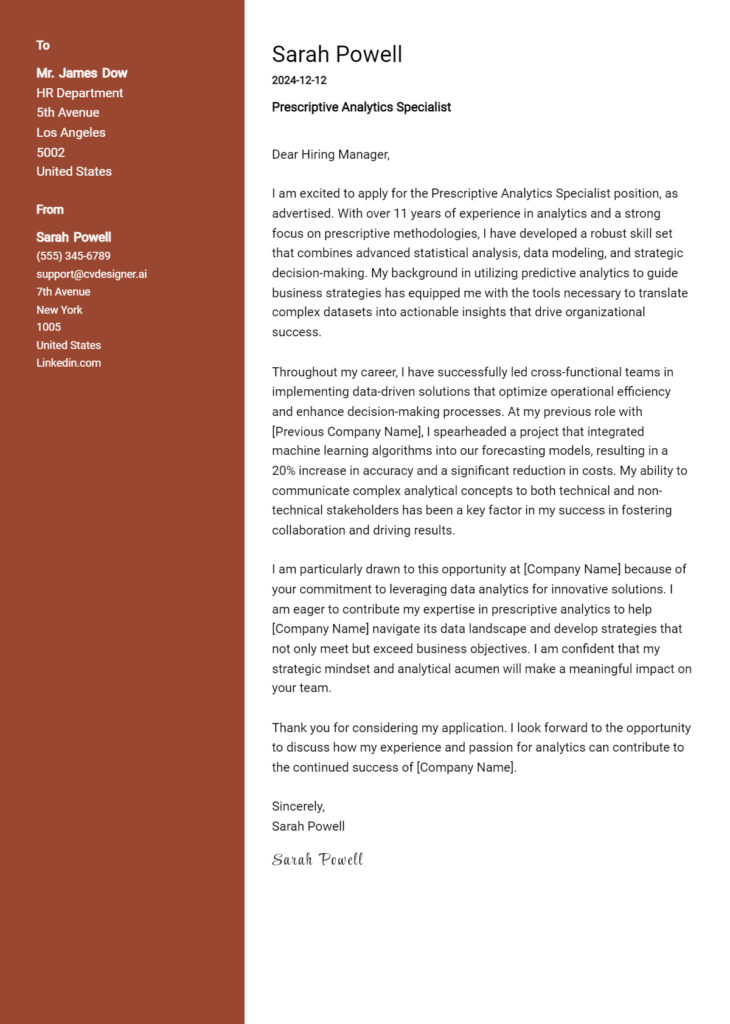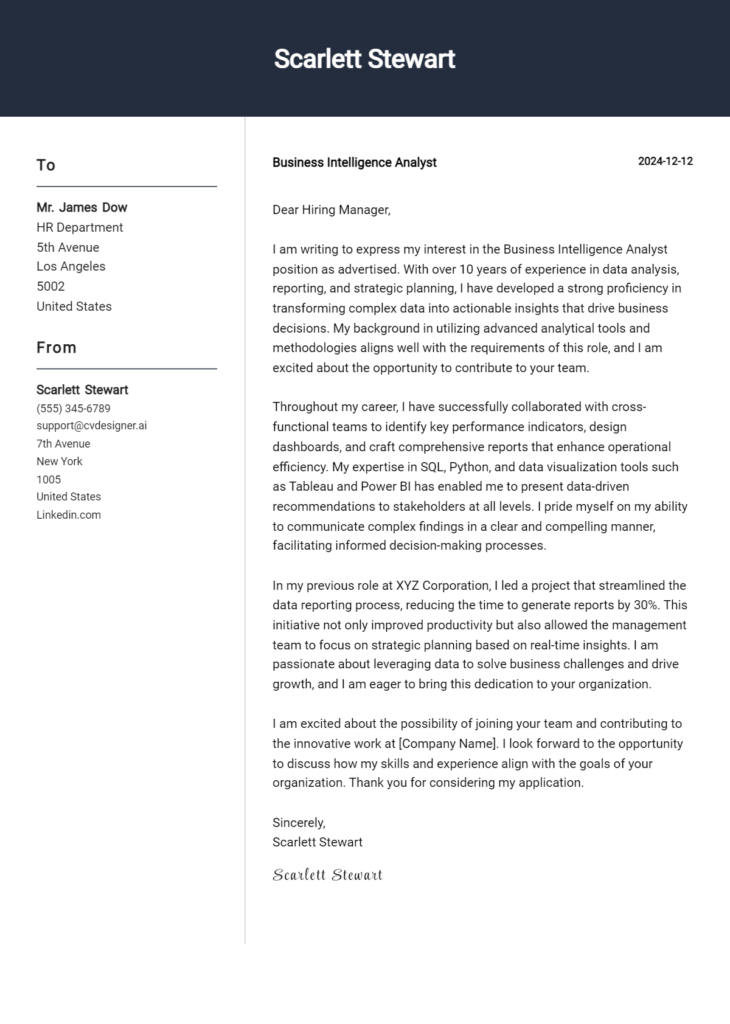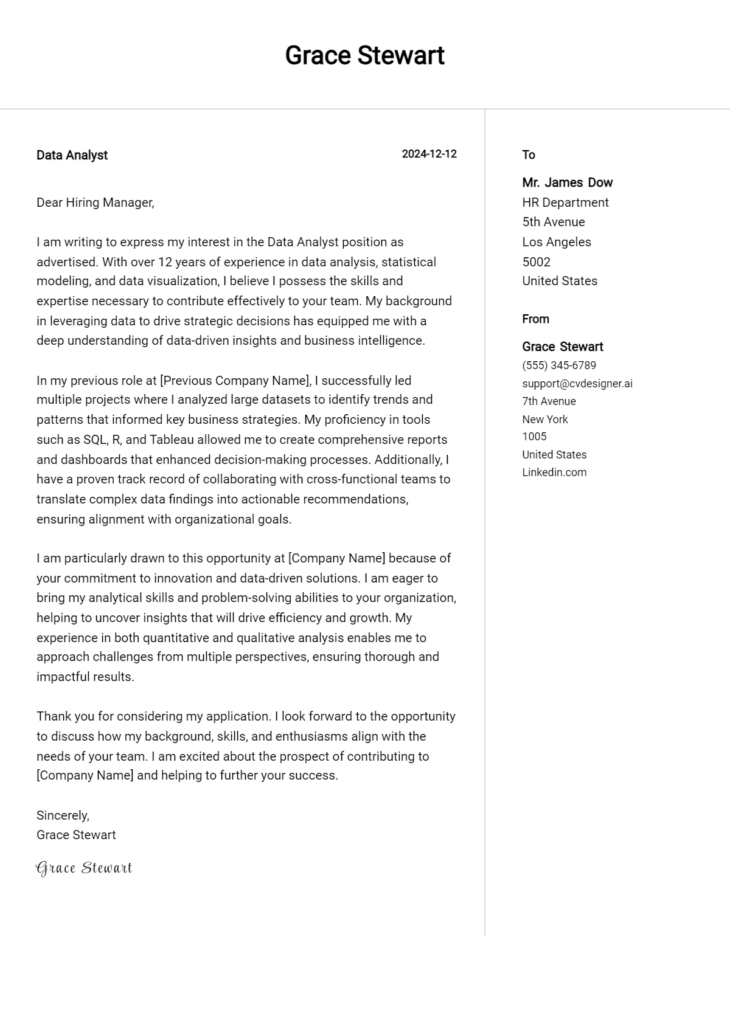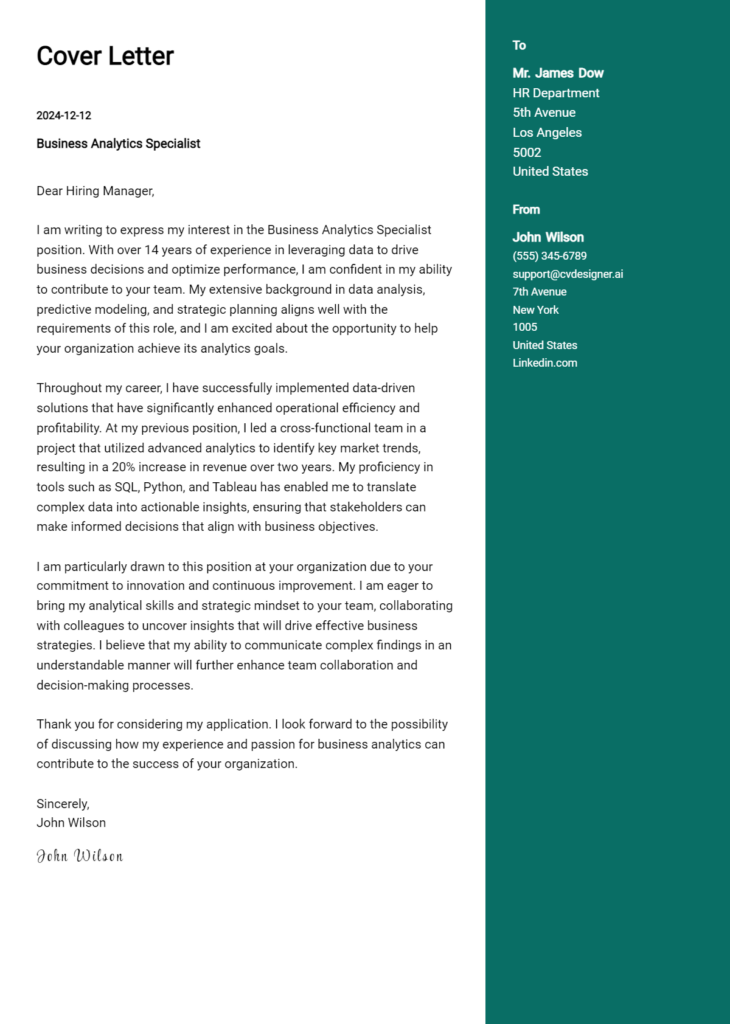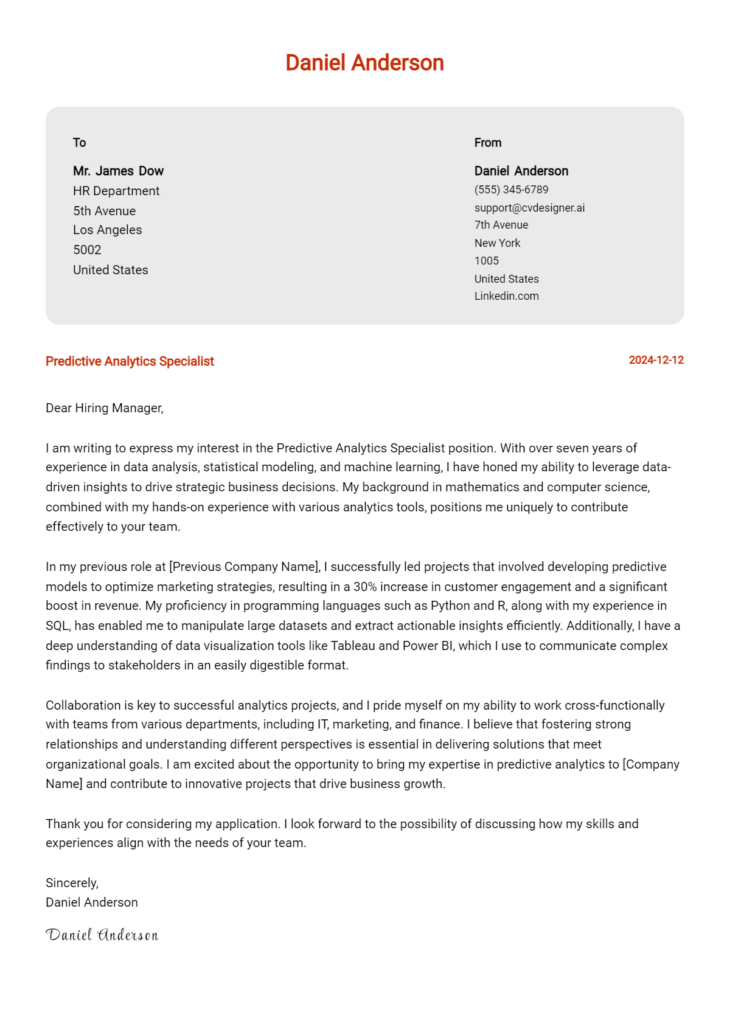Diagnostic Analytics Specialist Cover Letter Examples
Explore additional Diagnostic Analytics Specialist cover letter samples and guides and see what works for your level of experience or role.
How to Format a Diagnostic Analytics Specialist Cover Letter?
Crafting a compelling cover letter is essential for a Diagnostic Analytics Specialist, as it serves as your first opportunity to demonstrate your analytical capabilities and attention to detail. Proper formatting not only enhances readability but also reflects your professionalism—qualities that are critical in the field of data analytics. A well-structured cover letter allows you to effectively communicate your qualifications and experiences while capturing the hiring manager's interest.
In this guide, we will explore the essential components of a professional cover letter tailored for a Diagnostic Analytics Specialist role, including:
- Cover Letter Header
- Cover Letter Greeting
- Cover Letter Introduction
- Cover Letter Body
- Cover Letter Closing
Each section is crucial in showcasing your expertise and commitment to the role. Let’s delve into each part and discuss how to craft a standout cover letter in the field of diagnostic analytics.
The Importance of a Cover Letter Header for a Diagnostic Analytics Specialist
A well-crafted cover letter header is crucial for a Diagnostic Analytics Specialist as it provides a first impression of your professionalism and attention to detail. The header should include your contact information, the date, and the recipient's details. Clarity in this section ensures that your application is easily identifiable and accessible to hiring managers. A strong header reflects your organizational skills, while a weak one may create confusion or appear unprofessional.
Strong Example
John Doe 123 Analytics Ave Data City, ST 12345 johndoe@email.com (123) 456-7890 October 1, 2023 Jane Smith Hiring Manager Data Solutions Corp 456 Industry Blvd Tech Town, ST 67890
Weak Example
John D data@info.com 1/10/23 Ms. S Company XYZ
The Importance of the Cover Letter Greeting
The greeting of a cover letter serves as the opening statement that sets the tone for the entire correspondence. It establishes a level of professionalism and personalization that can significantly impact the hiring manager's first impression. By addressing the hiring manager directly, you demonstrate respect and attention to detail, which are vital qualities for a Diagnostic Analytics Specialist. Avoiding generic greetings such as "To Whom It May Concern" shows that you have taken the time to research the recipient’s name, thereby enhancing your connection with them. If you are uncertain of the name, consider exploring the company’s website or LinkedIn profiles to find the appropriate contact.
To help illustrate the difference between effective and ineffective greetings, here are examples of both:
Strong Greeting Example
Dear Dr. Jane Smith,
Weak Greeting Example
To Whom It May Concern,
The Importance of a Strong Cover Letter Introduction for a Diagnostic Analytics Specialist
A well-crafted cover letter introduction is crucial for a Diagnostic Analytics Specialist as it serves as the first impression a candidate makes on the hiring manager. This opening paragraph must effectively capture attention, express genuine interest in the position, and briefly highlight key skills or relevant achievements. A strong introduction sets the tone for the rest of the cover letter, encouraging the reader to delve deeper into the candidate's qualifications. Conversely, a weak introduction can lead to an immediate disinterest, causing the candidate to miss out on a valuable opportunity. Below are examples of strong and weak cover letter introductions for a Diagnostic Analytics Specialist.
Strong Example
Dear Hiring Manager, I am excited to apply for the Diagnostic Analytics Specialist position at [Company Name]. With a robust background in data analysis and a proven track record of transforming complex datasets into actionable insights, I am eager to leverage my expertise in predictive modeling and statistical analysis to enhance patient outcomes. My recent project, which resulted in a 20% increase in diagnostic accuracy through advanced data interpretation, showcases my commitment to driving healthcare innovation and my passion for utilizing analytics to make a tangible difference.
Weak Example
To whom it may concern, I would like to apply for the job you have posted. I have some experience in data analysis. I think I could be a good fit for the Diagnostic Analytics Specialist position but I am not sure yet. I hope you consider my application.
Purpose of the Cover Letter Body for a Diagnostic Analytics Specialist
The cover letter body for a Diagnostic Analytics Specialist serves as a crucial platform for candidates to articulate their unique skill set, relevant experiences, and the value they can bring to the organization. This section should effectively detail specific projects or accomplishments that demonstrate the candidate's analytical prowess and problem-solving capabilities. By showcasing quantifiable results from past roles, such as improving operational efficiency or contributing to significant cost savings, the candidate can create a compelling narrative that aligns their expertise with the needs of the company.
Strong Example
In my previous role at XYZ Corporation, I successfully led a project that leveraged advanced diagnostic analytics to identify inefficiencies in our supply chain processes. By implementing a predictive analytics model, I was able to reduce delivery times by 20%, resulting in a cost savings of over $250,000 annually. My experience in utilizing tools like Tableau and Python for data visualization and analysis has equipped me with the skills necessary to translate complex data into actionable insights. I am excited about the opportunity to bring my analytical skills and proven track record of delivering results to your team at ABC Inc.
Weak Example
I have worked in analytics for a few years and have some experience with data. I think I would be good for this position because I like working with numbers. I helped my last company but don’t remember the details. I have some skills in Excel and have done some basic reporting. I hope to learn more in this role.
Importance of the Cover Letter Closing for a Diagnostic Analytics Specialist
The closing paragraph of a cover letter is crucial for leaving a lasting impression on the hiring manager. For a Diagnostic Analytics Specialist, it should succinctly summarize your qualifications, reiterate your enthusiasm for the role, and encourage the reader to take the next steps, such as reviewing your resume or scheduling an interview. A strong closing not only reinforces your suitability for the position but also demonstrates your proactive approach and eagerness to contribute to the organization.
Strong Example
Thank you for considering my application for the Diagnostic Analytics Specialist position. With my extensive background in data analysis and a strong track record of improving diagnostic processes, I am excited about the opportunity to contribute to your team. I look forward to the possibility of discussing how my skills and experiences align with your company's goals. Please feel free to review my resume, and I would welcome the chance to schedule an interview at your convenience.
Weak Example
I hope you find my application interesting. I have some experience in analytics, and I think I could do the job. Please look at my resume when you get a chance. Thank you.
Crafting an effective cover letter for a Diagnostic Analytics Specialist position is crucial to making a strong first impression on potential employers. A well-structured cover letter not only showcases your technical skills but also highlights your problem-solving abilities, understanding of the Software Development Life Cycle (SDLC), teamwork experience, and your passion for continuous learning. The following tips will guide you in creating a compelling cover letter that stands out in a competitive job market.
Tips for Writing an Effective Cover Letter
Highlight Your Technical Skills
Begin by showcasing your technical expertise relevant to diagnostic analytics, such as proficiency in data analysis tools (e.g., Python, R, SQL) and experience with statistical modeling. Be specific about your skills and how they have been applied in previous roles. For instance, mention any projects where your technical acumen led to significant insights or improvements.Demonstrate Problem-Solving Abilities
Employers seek candidates who can tackle complex problems. Share examples of challenges you faced in past roles and how you approached them analytically. Highlight your thought process and the impact of your solutions to demonstrate your problem-solving capabilities effectively.Showcase Your Knowledge of the SDLC
Understanding the Software Development Life Cycle is vital for a Diagnostic Analytics Specialist. Discuss your experience with various stages of the SDLC, emphasizing how you’ve collaborated with cross-functional teams to ensure that analytics solutions align with development goals and timelines.Emphasize Teamwork and Collaboration
In the field of analytics, working well with others is essential. Provide examples of how you have successfully collaborated with colleagues from different departments, such as IT, marketing, or operations, to achieve common objectives. Highlight any specific contributions you made that enhanced team performance or project outcomes.Express Your Passion for Continuous Learning
The analytics landscape is constantly evolving, making it important to convey your commitment to ongoing professional development. Mention any relevant certifications, training, or workshops you have completed recently. You can also discuss your plans for further learning, such as pursuing advanced courses or participating in industry conferences.
By incorporating these elements into your cover letter, you can effectively convey your qualifications and enthusiasm for the Diagnostic Analytics Specialist role. For additional assistance, consider using our cover letter templates or our cover letter builder to create a professional and polished document.
Common Mistakes to Avoid in a Diagnostic Analytics Specialist Cover Letter
Crafting a compelling cover letter is essential for standing out in the competitive field of diagnostic analytics. Avoiding common mistakes can significantly enhance your chances of making a positive impression. Here are five common pitfalls to steer clear of when writing your cover letter:
Generic Content: Many candidates use a one-size-fits-all approach. Tailoring your cover letter to the specific job and organization demonstrates genuine interest. Research the company's values and highlight how your skills align with their needs.
Lack of Specific Examples: Failing to provide concrete examples of your achievements can weaken your application. Use data and results to demonstrate your expertise in diagnostic analytics to create a persuasive narrative.
Ignoring the Format: Poor formatting can make your cover letter hard to read. Adhere to a professional cover letter format to ensure clarity and organization.
Overly Technical Jargon: While your role requires technical knowledge, using excessive jargon can alienate the reader. Aim for clarity by explaining complex concepts in simple terms, especially for hiring managers who may not have a technical background.
Neglecting to Proofread: Spelling and grammatical errors can undermine your professionalism. Always proofread your cover letter multiple times or use tools to help catch mistakes before submission.
Lack of Enthusiasm: A cover letter should convey your passion for the role. Use a confident tone and express your excitement about contributing to the organization, which helps create a connection with the reader.
Not Including a Call to Action: Failing to encourage follow-up can diminish the impact of your closing. Conclude with a strong statement expressing your eagerness to discuss how you can contribute, inviting them to reach out.
By avoiding these mistakes and following best practices, you can create a standout cover letter that highlights your qualifications as a Diagnostic Analytics Specialist. For inspiration, check out some cover letter examples to help guide your writing.
Cover Letter FAQs for Diagnostic Analytics Specialist
What should I include in my cover letter for a Diagnostic Analytics Specialist position?
In your cover letter, it's essential to highlight your relevant skills and experiences tailored to the Diagnostic Analytics Specialist role. Start with a strong introduction that captures the hiring manager's attention. Include specific examples of your experience with data analysis, diagnostic tools, and any relevant software or programming languages (e.g., Python, R). Discuss your problem-solving skills and how you've applied them in past roles to improve business outcomes. Finally, express your enthusiasm for the company and the role, emphasizing how your background aligns with their mission and goals.
How can I demonstrate my analytical skills in my cover letter?
To demonstrate your analytical skills in your cover letter, use concrete examples from previous roles where you successfully tackled complex problems through data analysis. Describe specific projects where you utilized diagnostic analytics to derive insights and make data-driven decisions. Quantify your achievements whenever possible – for instance, mentioning how your analyses led to a certain percentage increase in efficiency or cost savings. Additionally, reference any relevant certifications or training that further validate your analytical capabilities, such as coursework in statistics, data mining, or machine learning.
Should I tailor my cover letter for each job application?
Absolutely! Tailoring your cover letter for each job application is crucial. It shows the hiring manager that you are genuinely interested in the position and have taken the time to understand the specific requirements of the role. Review the job description carefully and align your skills and experiences with the key responsibilities outlined. Use keywords from the job posting to demonstrate that you meet their expectations. A personalized cover letter not only helps you stand out but also allows you to convey how you can uniquely contribute to the company's success.
How long should my cover letter be for a Diagnostic Analytics Specialist role?
Your cover letter should ideally be one page long, consisting of 3 to 4 paragraphs. Each paragraph should be concise and focused on specific aspects of your qualifications. Start with an engaging introduction, followed by a body that highlights your relevant skills and experiences, and conclude with a strong closing statement that reiterates your interest in the position. Aim for clarity and brevity; hiring managers often skim cover letters, so being clear and to the point will keep their attention and ensure your key qualifications are easily understood.
Build your Cover Letter in minutes
Use an AI-powered cover letter builder and have your letter done in 5 minutes. Just select your template and our software will guide you through the process.

